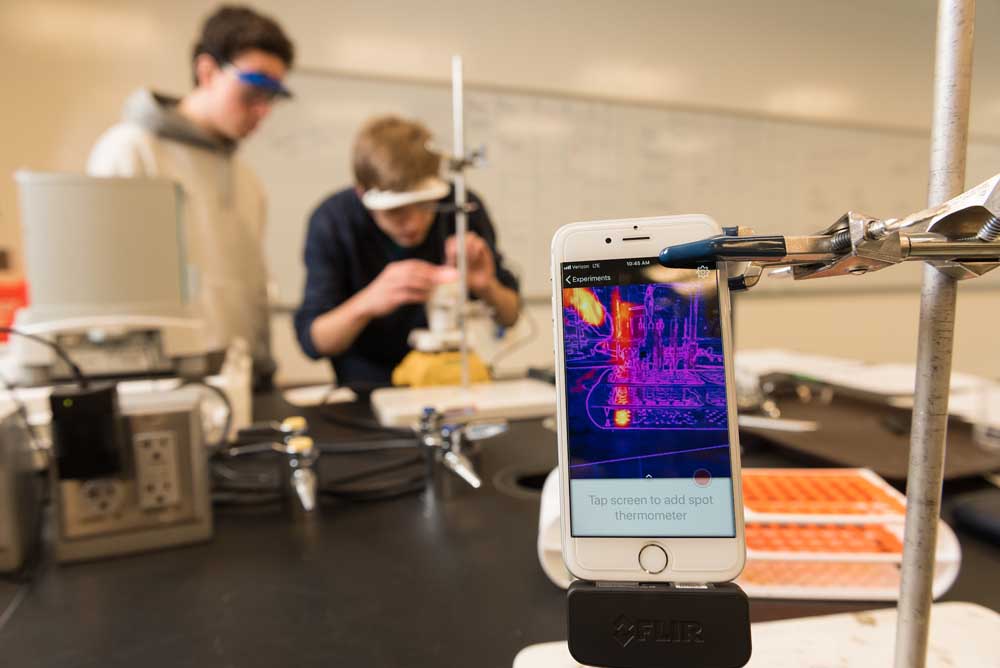Sponsored Content
Science studies at COCC can serve as a bachelor’s degree foundation
Published 11:21 am Wednesday, November 1, 2023

- Studies include advanced labs and cutting-edge research
With its microscope stations, rack of white lab coats and human skeleton models hooked to rolling stands, the anatomy lab at the Redmond campus of Central Oregon Community College (COCC) certainly seems primed for physiological discovery. But, um, what about all the lunch items?
“It looks like a culinary school in here, for today at least,” says a grinning assistant professor of biology Matthew Higgins, Ph.D., who has handed out bananas, apples and hard-boiled eggs to his 19 students in clusters that resemble lunch trays more than dissection trays. The day’s exercise — part of a course which also incorporates animal dissection and cadaver observation into its curriculum — is centered on making incisions that explore the planes of a body while reinforcing anatomical terminology.
A female student slices into the hard-boiled “tissue” of an egg, and then slices again. “A mid-sagittal plane exposes the most yolk,” she says, eyeing her work. When it comes to the banana, the exercise packet requires a cut that “enters laterally and makes a complete frontal-coronal incision at the level of the umbilicus.” As the students carve, they gain confidence in anatomical locations, making their way from anterior to dorsal, superior to inferior.
The interactive biology class is part of an extensive catalog of science disciplines at COCC, from physics to chemistry to engineering, that can take students into a range of science-based educational paths. Jeff Bowen, who received a biology-focused AAOT this past year, was excited that COCC offered a pre-medical and pre-dental educational path. “I aspire to not only work on the front lines of future pandemics, but also to use my skills to bring awareness and education about preventative care and health risks,” says the current pre-med student at Oregon State University.
Most science classes at COCC are predominantly held in the Bend campus’s modern Middleton Science Center: The glassy, multilevel space offers access to inspiring academic resources, including advanced lab equipment, cutting-edge educational research, and even a sizeable herbarium.
The college’s three other campuses offer an ongoing rotation of science coursework. The Redmond campus, with its dedicated labs, typically features biology and chemistry classes among its regular course listings. COCC Prineville students can take a field trip-oriented geology class called “The Dynamic Earth” that explores earthquakes and volcanoes. COCC Madras will have an astronomy class this academic year. And beginning in fall 2024, COCC Madras will add additional science classes for students in need of prerequisite coursework ahead of the Nursing, Medical Assistant and Certified Nursing Assistant programs coming to that campus.
COCC students can earn a transfer degree with a science focus in any of the college’s science disciplines. Transfer degrees, which last year comprised some 55% of the overall awards issued by COCC, take the form of an Associate of Science degree or an Associate of Arts Oregon Transfer degree, an AAOT degree, both of which readily connect students’ COCC credits to four-year universities. The AAOT is designed to fully conform to state of Oregon public university guidelines and meet all lower-division requirements.
COCC offers an extensive catalog of science disciplines, from geology to physics to chemistry, that can take students into a range of science-based educational paths.
Oregon’s seven public university’s include University of Oregon, Oregon State University (Bend and Corvallis), Eastern Oregon University, Oregon Institute of Technology, Portland State University, Southern Oregon University and Western Oregon University. A number of other institutions accept the AAOT degree, from George Fox College to Linfield College, Pacific University to Willamette University, plus others.
Austin Steimer, a product development engineer at EarthCruiser Overland Vehicles, received a physics-focused AAOT degree at COCC and went on to earn a bachelor’s degree in energy systems engineering from OSU-Cascades. His time at COCC helped ignite his curiosity. “My professor showed the power of how a simple calculation could help you predict physical action in endless real-world scenarios,” he remembers. “He had a way of bringing math to life.
” Some students who plan to attend OSU-Cascades may choose to pursue their science-focused degree, such as energy systems engineering, through the Degree Partnership Program. Students apply through OSU-Cascades and simply opt-in for the program. They can register for classes at both places — with COCC having a larger range of classes and class times — or start at COCC and shift to OSU-Cascades for their final two years, which means they pay lower tuition rates early on.
Brittnye Freeberg found a post-class discussion at COCC to be something of a career catalyst. Immersed in her biology studies at the time, but unsure of her ultimate goals, she went to office hours one day after a cell lab for a chat “to clarify subject matter” with Meredith Humphries, assistant professor of biology. Freeberg found clarity that went beyond a cellular level.
“We had a stimulating conversation about the options in the health field for someone like me, who doesn’t necessarily want to be a doctor or a nurse that has to poke people,” she recalls. After using her AAOT to complete a bachelor’s degree, she became a product development scientist for Lonza working on a host of drug development projects.
Visit cocc.edu/departments/science to explore more. COCC’s winter term begins Jan. 8; admissions application deadline is Dec. 31.








